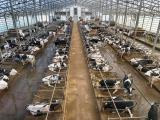Apr 8, 2013 (CIDRAP News) – Chinese health officials have reported eight more H7N9 infections, one of them fatal, since Apr 5, most of them men age 55 and older, including two who had mild infections.
All of them are from the same areas of eastern China that have already reported cases. Five are from Shanghai, two are from neighboring Jiangsu province, and one patient is from Anhui province. The new cases lift the total to 24 infections, 7 of them fatal.
Details about the latest lab-confirmed cases were included in Apr 6 and 7 statements from the World Health Organization (WHO) and a notice today from Hong Kong's Centre for Health Protection (CHP). The patients' illness-onset dates ranged from Feb 19 to Apr 1.
The patient who died was a 64-year-old man from Shanghai, according to the CHP. His death raises the death toll from the H7N9 virus to seven.
Of the four patients who are in critical condition, two are from Shanghai, including a 74-year-old man and a 59-year-old man. The others are two patients from Jiangsu province, an 85-year-old man and a 25-year-old woman.
A 55-year-old man from Anhui province is in stable condition with the infection, and mild infections were reported in two patients from Shanghai, a 60-year-old man and a 67-year-old man.
The WHO in its Apr 7 statement said 530 close contacts of the confirmed cases are under close monitoring. The CHP added that 66 close contacts of the three most recently reported patients—the man from Shanghai who died and the two patients from Jiangsu province—are being monitored and that so far none have symptoms.
Medical authorities in Jiangsu province are still investigating a contact of an earlier confirmed case who reported flu-like symptoms, according to the WHO. So far there is no evidence of ongoing human-to-human transmission, it said.
In other developments, the H7N9 virus has been detected in quail at a live poultry market in the city of Hangzhou, which prompted culling and a ban on live poultry trading at the market, China Central Television (CCTV), a state television broadcaster based in Beijing, reported on Apr 6. The report said one of the confirmed cases from the city got sick after eating quail from the market.
Government officials in Nanjing, Jiangsu's capital, closed all wholesale poultry markets on Apr 6, the South China Morning Post, an English-language newspaper based in Hong King, reported yesterday.
Xinhua, China's state news agency, today reported that 111,000 birds have been culled in the Shanghai area as of last night. Sun Lei, who leads Shanghai's Agriculture Commission, told Xinhua that so far testing has not detected H7N9 on local poultry farms.
An official from the WHO's Beijing office said today that a discussion is underway with China's government to allow an international team of experts to help China investigate the new flu strain, the Associated Press (AP) reported today.
Michael O'Leary, who heads the WHO's office in Beijing, said the group has confidence in China's ability to track and control the outbreak, but growing global interest in the virus has moved the WHO to consider sending a team. "WHO's responsibility in part is to make sure that we serve as liaison and linkage between China and the rest of the world," he said at a media briefing in China.
He said the possibility is still being discussed by Chinese and WHO officials and that if and when the expert team is sent, it would include epidemiologic, laboratory, and communications experts.
At the media briefing, Chinese officials said they are mobilizing resources across the nation to battle H7N9, monitoring hundreds of close contacts of human cases, and culling thousands of birds wherever the virus is found, Reuters reported today. Lin Ben, the head of China's National Health and Family Planning Commission, told the news service, "We are confident we can effectively control it."
See also:
Apr 6 WHO statement
Apr 7 WHO statement
Apr 8 CHP statement
Apr 7 Post story
Apr 8 Xinhua story
Apr 8 Reuters story


















